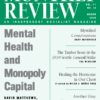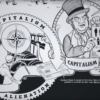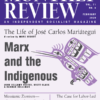Democracy, Planning, and Big Data
Starting in the late 1960s, the development of the productive forces of society entered a new stage: the Information Revolution, an era focused on the application of information theories such as cybernetics combined with advances in computer technology and digital communication networks, culminating in the Internet. Under capitalist conditions, this has already resulted in a knowledge economy, but the social, auto-regulatory possibilities it opens up are bound to be incompatible with the private appropriation characteristic of capitalism. | more…

Dead Labor
My pop was always working on our house, a shack that was all my parents could afford in the great hunger for homeownership that came after the Second World War. But nothing ever quite got finished, either for lack of funds or motivation. But if he wasn’t quite a craftsman himself, he admired craft. He was moved by the effort and intricacy of how things were made. ‘Honey, look at this old wooden chest with these lovely silver handles. Think of all the work that was done to this thing by someone’s hands.’ | more…

The Legacy of Clinton Jencks
In 1950, the mainly Mexican and Mexican-American members of the International Union of Mine, Mill and Smelter Workers Local 890 went on strike against Empire Zinc in southern New Mexico. One of the only fair-haired and pale-skinned union men in meetings and jail was Mine Mill organizer Clinton Jencks. Raymond Caballero’s study, McCarthyism vs. Clinton Jencks, exhaustively details how the federal government brought the entire weight of its repressive apparatus down on the heads of Jencks, his family, and his union siblings. | more…

Health Care for Profit (Not Health)
Health Care Under the Knife, a collection of essays under the editorship of Howard Waitzkin, presents a vigorous critique of health within the context of capitalism, examining the extent to which the economy and its relations of production determine how health is socially distributed, the conditions of medical practice, and the structural organization of health systems. Rather than considering health as primarily a biomedical phenomenon and health systems as autonomous institutions, the volume recognizes the intricate fundamental relationship between health and the wider political, economic, and sociological context. | more…

March 2020 (Volume 71, Number 10)
According to the U.S. Bureau of Labor Statistics, the U.S. economy is experiencing an unemployment rate that is at a fifty-year low. Yet, wage growth continues to be weak, with continuing wage stagnation even at the peak of the business cycle. A major and largely undertheorized reason for the sluggish wages in a period of seeming full employment is to be found in the fact that the new jobs being created by the economy do not measure up to those of the past in terms of weekly wages and hours, or in the degree to which they support households or even individuals. | more…

Hyman Minsky at 100: Was Minsky a Communist?
Since the Great Financial Crisis of 2007–09, Hyman Minsky (1919–96) has been widely recognized as one of the late twentieth century’s most insightful economic theorists. Nevertheless, if Minsky had still been alive at the time of the Great Financial Crisis, there would have been little likelihood that his new-found reputation would have resulted in his receiving the Nobel Prize in Economics given his heterodox and socialist economic views. | more…

Mystified Consciousness
The great French Marxist Henri Lefebvre authored sixty-eight books, since translated into thirty languages, making brilliant analyses on dialectics and alienation, everyday life and urbanism, ecology and citizenship. Yet, his La conscience mystifiée(Mystified Consciousness), published in 1936, has seemingly been forgotten in every language, largely ignored everywhere. Though it may well be his most enduring political tract, it was his most prescient thesis for understanding the human condition in the twenty-first century. | more…

A Theory of Mental Health and Monopoly Capitalism
As an exposition of capitalism’s contradictions, Paul Baran and Paul Sweezy’s Monopoly Capital remains one of the most influential treatises in Marxist political economy produced in North America. Among Baran and Sweezy’s sociological investigations, they identified the negative consequences of capitalism for mental health, drawing attention to the manner in which the organization of capitalist society conflicted with the essential needs of the individual. | more…

The Quality of Monopoly Capitalist Society: Mental Health
When Paul Baran and Paul Sweezy’s Monopoly Capital was published by Monthly Review Press in 1966, two of the chapters originally drafted for the book were left out of the final volume: what was to have been Chapter 9 in the original plan for the book, entitled “Some Theoretical Implications,” and what was intended as Chapter 11, “The Quality of Monopoly Capitalist Society: Culture and Mental Health.” In July–August 2012, “Some Theoretical Implications” was finally published in Monthly Review. This was followed by the publication of the first part, approximately two-thirds of the whole, of “The Quality of Monopoly Capitalist Society: Culture and Mental Health,” titled “The Quality of Monopoly Capitalist Society: Culture and Communications,” in the July–August 2013 issue of the magazine. The section on mental health was left out on the grounds that it was incomplete. We finally publish it here. | more…

The Origins of the Seattle General Strike of 1919: The Timber Beast
Seattle in 1919 was an island in a still immeasurable sea of timber. The Pacific coastal forests were estimated to contain nearly two-thirds of the timber in the country, and the Washington State forests accounted for the largest part of these. The physical hardships associated with the lumber industry, including isolation deep within the rain forests, made working conditions an even more miserable burden than low wages. The work was seasonal and layoffs were common; the completion of one job might mean termination and the search for work elsewhere. When the winter rains brought an end to work in the woods, the state’s loggers fled to the city, not welcome elsewhere. In some years, there might be thousands on Seattle’s streets. | more…

Healing the Hurricane in Our Chest
Healing through the stories we rescue and the history we make is what Aurora Levins Morales’s Medicine Stories: Essays for Radicals is about. The author, a historian curandera, compiled a series of twenty-eight essays in this second edition, published twenty years after the first. Levins Morales theorizes movements for social justice and how to overcome challenges faced by activists and all those fighting and resisting oppression. She does this through accounts of her studies, personal experiences, and social conditions, providing a view of the world that allows collective healing and encourages it in others through a comprehensive understanding of history. | more…

Another Gray Afternoon in Guernica
A new poem by Kenneth Salzmann, author of The Last Jazz and Other Poems. | more…

February 2020 (Volume 71, Number 9)
According to the U.S. Bureau of Labor Statistics, the U.S. economy is experiencing an unemployment rate that is at a fifty-year low. Yet, wage growth continues to be weak, with continuing wage stagnation even at the peak of the business cycle. A major and largely undertheorized reason for the sluggish wages in a period of seeming full employment is to be found in the fact that the new jobs being created by the economy do not measure up to those of the past in terms of weekly wages and hours, or in the degree to which they support households or even individuals. | more…